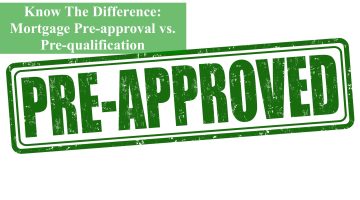No Obligation and transparency 24/7. Instantly compare live rates and costs from our network of lenders across the country. Real-time accurate rates and closing costs for a variety of loan programs custom to your specific situation.

You want to get your first home loan, but the list of documents and personal information you’ll need seems daunting.
Good news: when it comes to home mortgage loan applications, there’s definitely a difference between providing “everything you might eventually need” and “what you need to get the ball rolling.” This article will go into more detail about all the documents you need to get pre-approved.
The great thing is that if you start the pre-approval process with your must-have documents, your loan officer can let you know whether you will even need everything else that you anticipated.
In the meantime, you’ve also got the mortgage company working for you while you gather whatever additional documentation you may need.
Here is our list of the 4 must-have documents for quick and easy mortgage pre-approval, as well as an explanation of why you need them and where to find them.
You have to show how much money you make in order to prove what kind of bandwidth you have for a monthly mortgage payment. A good credit history also helps, but it’s not enough without a current income.
Pay stubs do not come in the same format for every company, but they should be provided on a formal printout or digital document with designations of the payor, payee, pay period, and amount.
Your employer likely keeps a record of your pay stubs if you don’t already keep them for yourself.
Your pay stubs show proof that you are currently employed and are receiving a regular paycheck that can help you sustain regular mortgage payments. But you may have other forms of income that can further solidify and strengthen your financial situation, which will increase your chances of mortgage approval.
Some info that you may want to supply your lender with that further support your income include the following:
If you own real estate for the sole purpose of investing, you’ll want to show these assets to your lender. For instance, perhaps you rent out your real estate properties. In this case, you’ll want to present information that shows the amount of rent you collect each month or year. You can use the information of this income to further qualify you for a mortgage.
If you’ve got dividends coming in on a regular basis from stock and bond investments, this can go towards your income. The same can be said about a 401(k) or IRAs.
In these cases, you’ll want to submit statements of these accounts to verify your assets. The more you can beef up your income, the stronger your position will be to get approved for a mortgage.
In order to verify a lot of things about your income, mortgage companies need your tax documents, usually for the last two years. This is especially true if you have income from some non-employer source such as an investment. Self-employed or contracted workers who don’t receive regular pay stubs will also want to use tax forms as an alternate sort of income record.
Even if you are not self-employed and you don’t have any investment income, you’ll still want the tax documents as a form of universal proof of income.
This is the most standardized and predictable group of documents, though, as anyone with a basic income will be entitled to a W-2 or I-9 from any employer and the original copy of their tax return documents from the IRS.
If you’ve lost any of the documents, then you can request another copy from the IRS for a small fee.
Your employer provides these documents to you, the employee, at the end of each year. The employer also sends them to the Social Security Administration, who provides proof to the IRS. You can find them in your completed tax return. If all else fails, request another copy of the return.
Aside from the copy of your tax return that you get early in the year from the IRS, you can visit the IRS website to obtain a copy of your tax transcripts.
Bank statements are especially relevant for proving that you have available funds for a down payment. This statement should, above all, show the current balance available and reiterate that you are in fact the owner of that account.
After all, when down payments are concerned, a mortgage company needs to know that you can carry out your portion of the closing even if you can easily afford to pay the monthly mortgage expenses. In fact, if you are paying for closing, the closing fees will also be expected in the account in addition to down payments.
Some mortgage companies ask for more than one month’s statement in order to prove that the money has remained on the balance. This is not always the case, but be prepared to provide a second or third balance statement.
In the event that you will receive the down payment money from someone else who is not on the application, you’ll have to prove that instead. You’ll need a gift letter proving that they are giving you the funds as well as their own bank statement proving that the funds are available.
For those who are curious, a declaration of cash on hand (not in the bank) is usually not acceptable. Documented proof is its own sort of currency for pre-approval.
While most banks offer monthly mail and electronic statements, you can obtain both a current balance and statement history at your bank’s website or at a physical banking location.
While you may not think that showing your lender your debt will help your case, it can actually have a positive effect on your application if your debt load is very small compared to your income. That’s because lenders will want to assess your debt-to-income (DTI) ratio, which is a measure of your debts relative to your income.
Generally speaking, 43% is the highest DTI that most lenders will accept. The lower the DTI, the better. So if your DTI is much lower than 43% because you have very little debt and a high income, you’ll be in a better position to get approved for a home loan.
Information regarding your debts that your lender will want to see include the following:
The application itself is the most crucial part of the pre-approval process. Despite the fact that your name, address, and contact information may be on the other documents, mortgage companies require a consolidated application.
The most important part of the document is the data needed for the credit check: your legal name and social security number.
Almost all mortgage companies offer their pre-approval applications online through their website. An application can usually be filled out online. If you’d rather, most companies allow applicants to print the form, fill out the application in pen, and then send it to a physical address.
Some companies also implement systems where the application can be printed and filled out with a pen before being scanned or photographed instead of mailed by hand.
With these must-have documents, you’ll be ready to start the ball rolling. If it seems easy, that’s because it is.
Have you already gotten these documents together? Apply now to get in touch with a mortgage expert to guide you through the rest of the process.
Will you need mortgage financing to buy a home in Washington State? We can help. Sammamish Mortgage has been serving buyers across the Pacific Northwest since 1992. We offer a wide variety of mortgage programs with flexible qualification criteria in WA, OR, ID, and CO. Please contact us today with any financing-related questions you have, or visit our website to get an instant rate quote.


Whether you’re buying a home or ready to refinance, our professionals can help.
{hours_open} - {hours_closed} Pacific
No Obligation and transparency 24/7. Instantly compare live rates and costs from our network of lenders across the country. Real-time accurate rates and closing costs for a variety of loan programs custom to your specific situation.